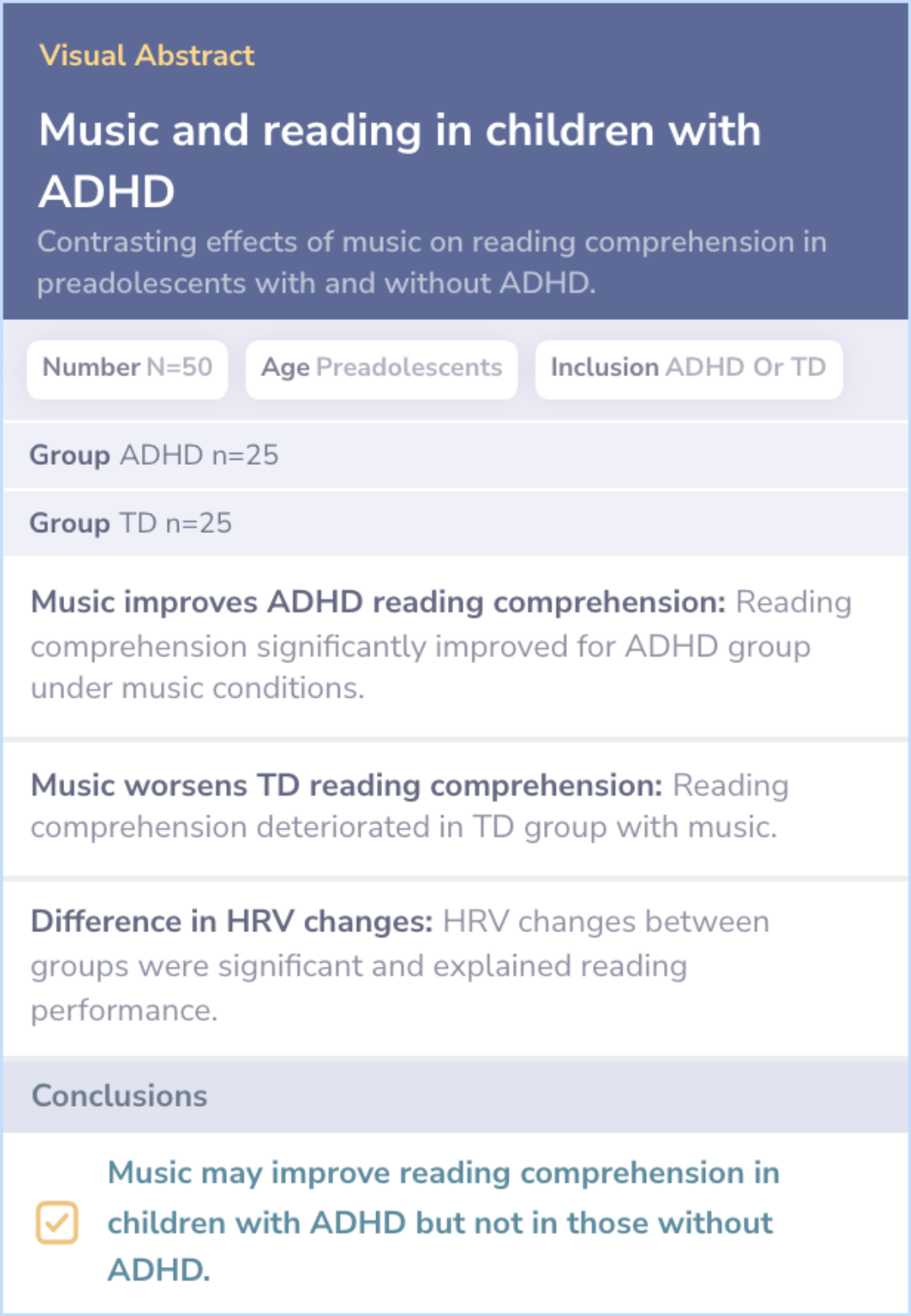Trending ADHD Papers
Visual Abstract
Effects of Music on Attention-Deficit/Hyperactivity Disorder (ADHD) and Potential Application in Serious Video Games: Systematic Review
Effects of Music on ADHD and Video Games
December 3, 2024
author
Martin-Moratinos M, Bella-Fernández M, Blasco-Fontecilla H
journal
J Med Internet Res
Date Published
2023 May 12
Why link to a visual abstract?
What is a visual abstract?
Original

Study Summary
🔬
What They Studied
The study analyzed whether music therapy benefits ADHD symptoms and proposed using music in video games as a treatment.
💡
What They Found
The study found music therapy improved ADHD symptoms such as social skills, attention, and impulsivity, while integrating music into video games enhanced immersion and timing skills.
📚
What This Means
The findings align with current guidelines for using therapeutic approaches, like Adderall and Ritalin (Methylphenidate), in managing ADHD symptoms and suggest adding music therapy and video games to treatment plans could optimize results.
Study Overview
Background & Objectives
ADHD, a common disorder affecting concentration and impulsivity, is often managed with medications like methylphenidate, which alters brain chemicals to mitigate symptoms. However, these drugs can have notable side effects.
This study explores whether music can be an effective alternative. Through a systematic review, researchers dissect existing data on music's potential to alleviate ADHD symptoms, particularly focusing on its application in video games.
This study explores whether music can be an effective alternative. Through a systematic review, researchers dissect existing data on music's potential to alleviate ADHD symptoms, particularly focusing on its application in video games.
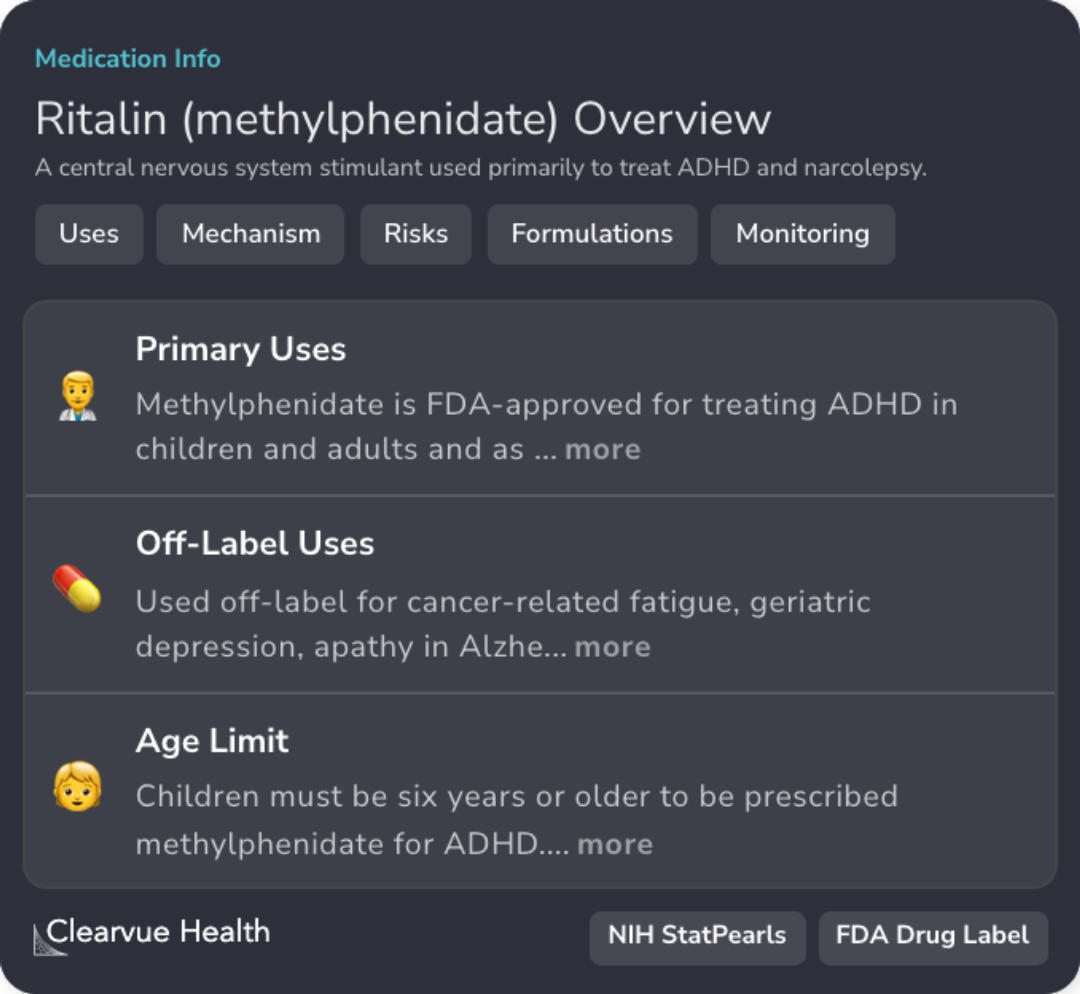
Abstract: background
The aim of the study is to (1) analyze the evidence that music is beneficial in reducing the symptomatology of ADHD using systematic re...more
Study Summary
Methods
Researchers conducted thorough searches in several databases, including PubMed and Cochrane, alongside grey literature sources like Google Scholar. They used specific search terms relating to music, music therapy, and ADHD.
By systematically reviewing these sources, they aimed to gather evidence on the role of music in managing ADHD symptoms, providing a solid foundation for their analysis and proposal of music in video games.
By systematically reviewing these sources, they aimed to gather evidence on the role of music in managing ADHD symptoms, providing a solid foundation for their analysis and proposal of music in video games.

Abstract: methods
Searches were conducted in PubMed, Embase, PsycINFO, Cochrane, and gray literature (Google Scholar and WorldCat). We used the following...more
Study Results
Results
From 70 records, 17 showed that music aids in different aspects of ADHD. Active music therapy can boost social skills and reduce aggressiveness, while passive listening enhances academic skills and attention.
The effectiveness is influenced by the type and tempo of music. Music in video games also appears beneficial, enhancing focus and immersion. Implementing rhythmic elements could further support ADHD patients, especially in therapeutic gaming environments.
The effectiveness is influenced by the type and tempo of music. Music in video games also appears beneficial, enhancing focus and immersion. Implementing rhythmic elements could further support ADHD patients, especially in therapeutic gaming environments.

Abstract: results
Of the 70 records identified, 17 provided findings that music can be beneficial in various domains of ADHD. Active music therapy improv...more
Study Summary
Conclusions
The study proposes enhancing ADHD treatment by integrating music into video games. This innovative approach could offer a complementary method to traditional ADHD treatments.
By combining music with interactive gaming, the study suggests a unique therapeutic strategy that harnesses music's beneficial properties, potentially improving patient outcomes and engagement in therapeutic processes.
By combining music with interactive gaming, the study suggests a unique therapeutic strategy that harnesses music's beneficial properties, potentially improving patient outcomes and engagement in therapeutic processes.
Abstract: conclusions
Improving ADHD treatment through the application of music in video games is proposed.
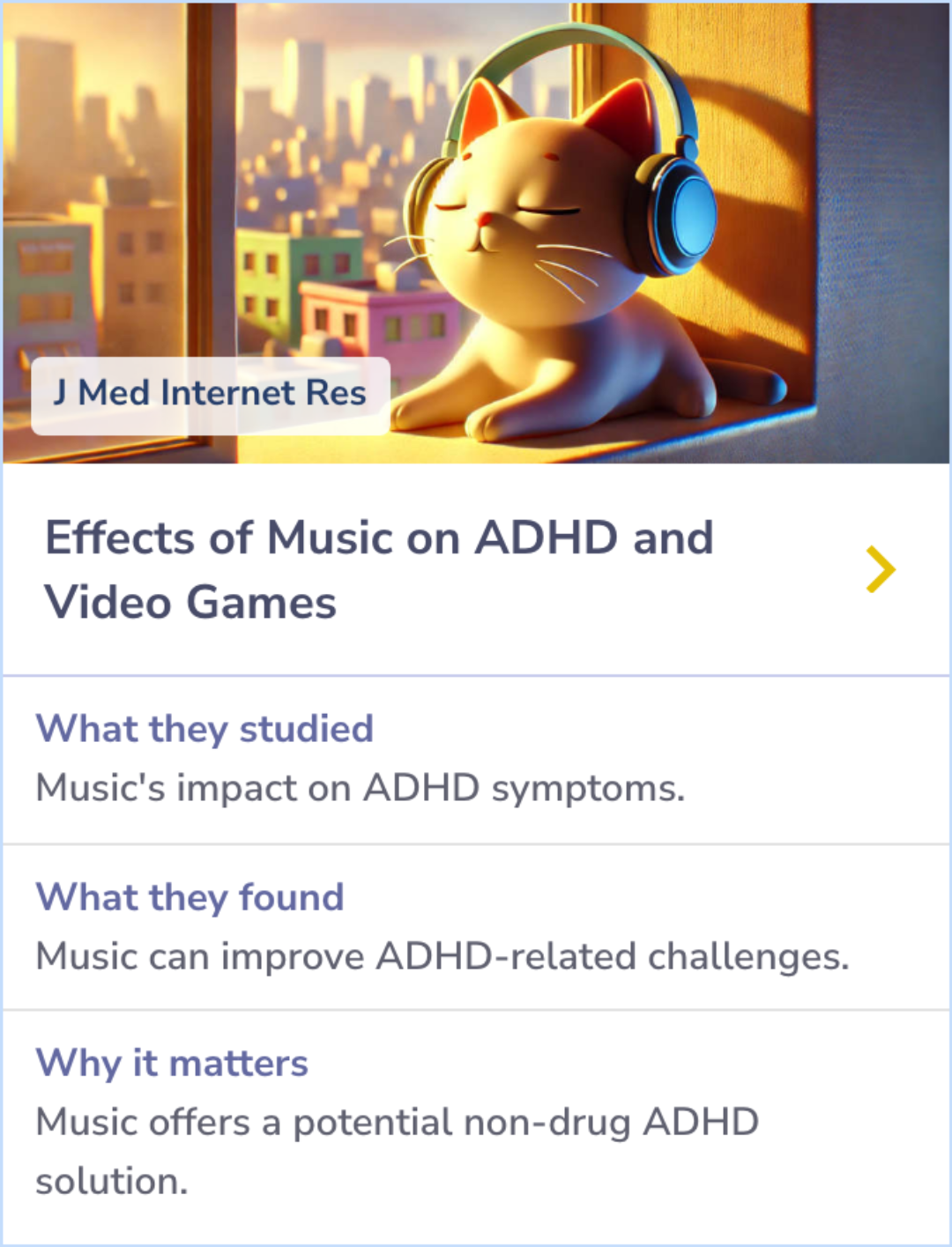
Clinical Guidelines
Guidelines suggest that ADHD, a common childhood disorder, often continues into adulthood. Combining medication with cognitive-behavioral therapy (CBT) significantly enhances treatment outcomes in adults with ADHD.
For preschool children, methylphenidate is the recommended first-line medication. Additionally, combining behavioral therapy with medication improves outcomes for pre-adolescents with ADHD.
For preschool children, methylphenidate is the recommended first-line medication. Additionally, combining behavioral therapy with medication improves outcomes for pre-adolescents with ADHD.
Literature Review
Park et al, 2023
Core Insight:Both papers explore music therapy as beneficial in ADHD treatment. The main paper emphasizes broader applications, incorporating video games, while this paper focuses on neurophysiological benefits against depression in children and teens.
What It Adds:
Therapeutic Dimensions: Adds neurophysiological focus to therapeutic benefits.
Depression Focus: Shows music's impact on depression in ADHD youth.
Implications:This paper reinforces music therapy's benefits and expands understanding to include potential impacts on depression and stress management in ADHD.
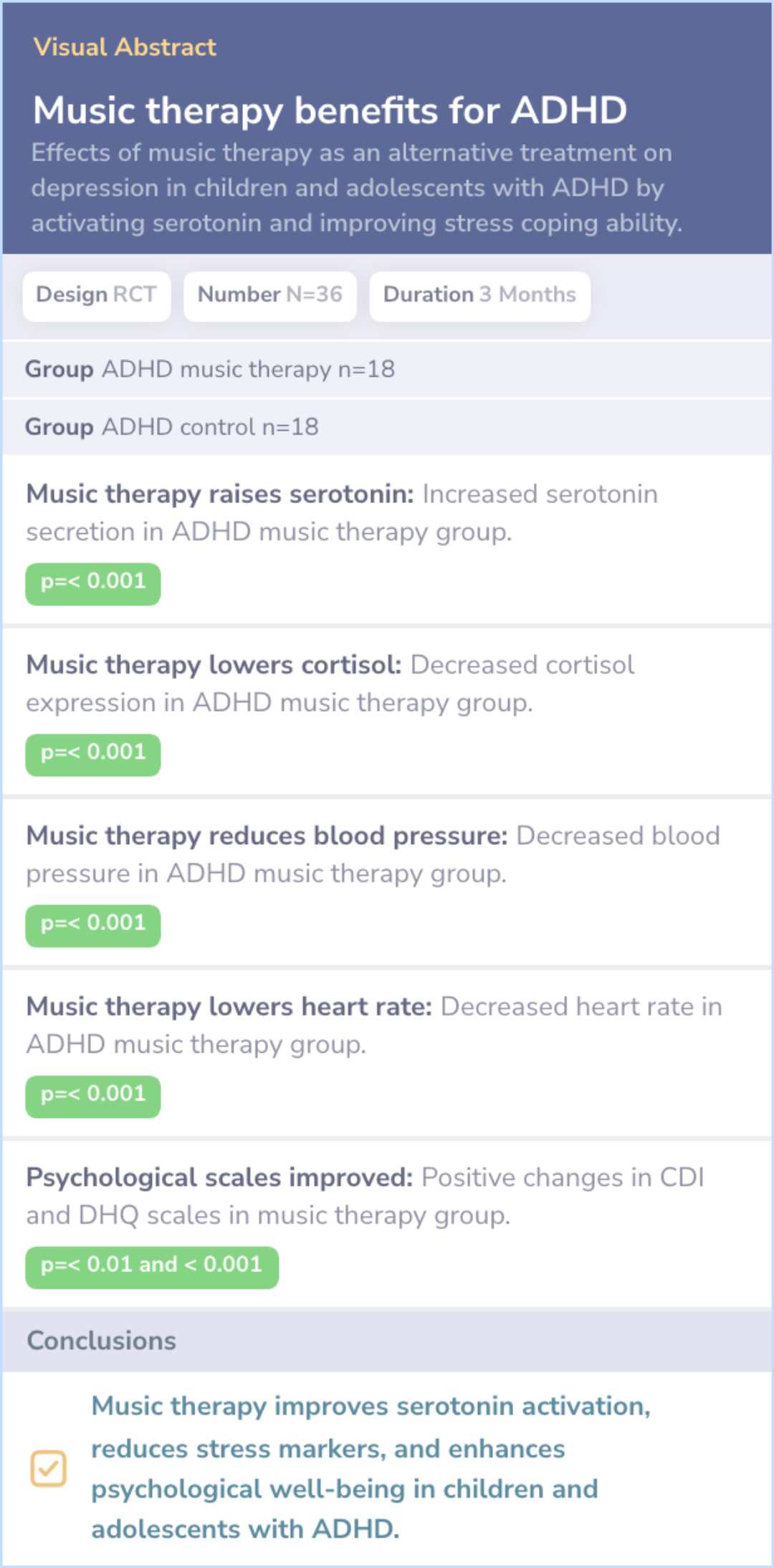
Literature Review
Martin-Moratinos et al, 2023
Core Insight:The comparison paper mirrors the main paper in its exploration of music as a treatment for attention-deficit/hyperactivity disorder, adding similar findings about the benefits of using music in video games.
What It Adds:
Reiterates Prior Findings: Confirms benefits of music therapy in treating ADHD symptomatology as stated in the main paper.
Aligns with Main Paper: Both papers propose integrating music into video games to aid ADHD treatment.
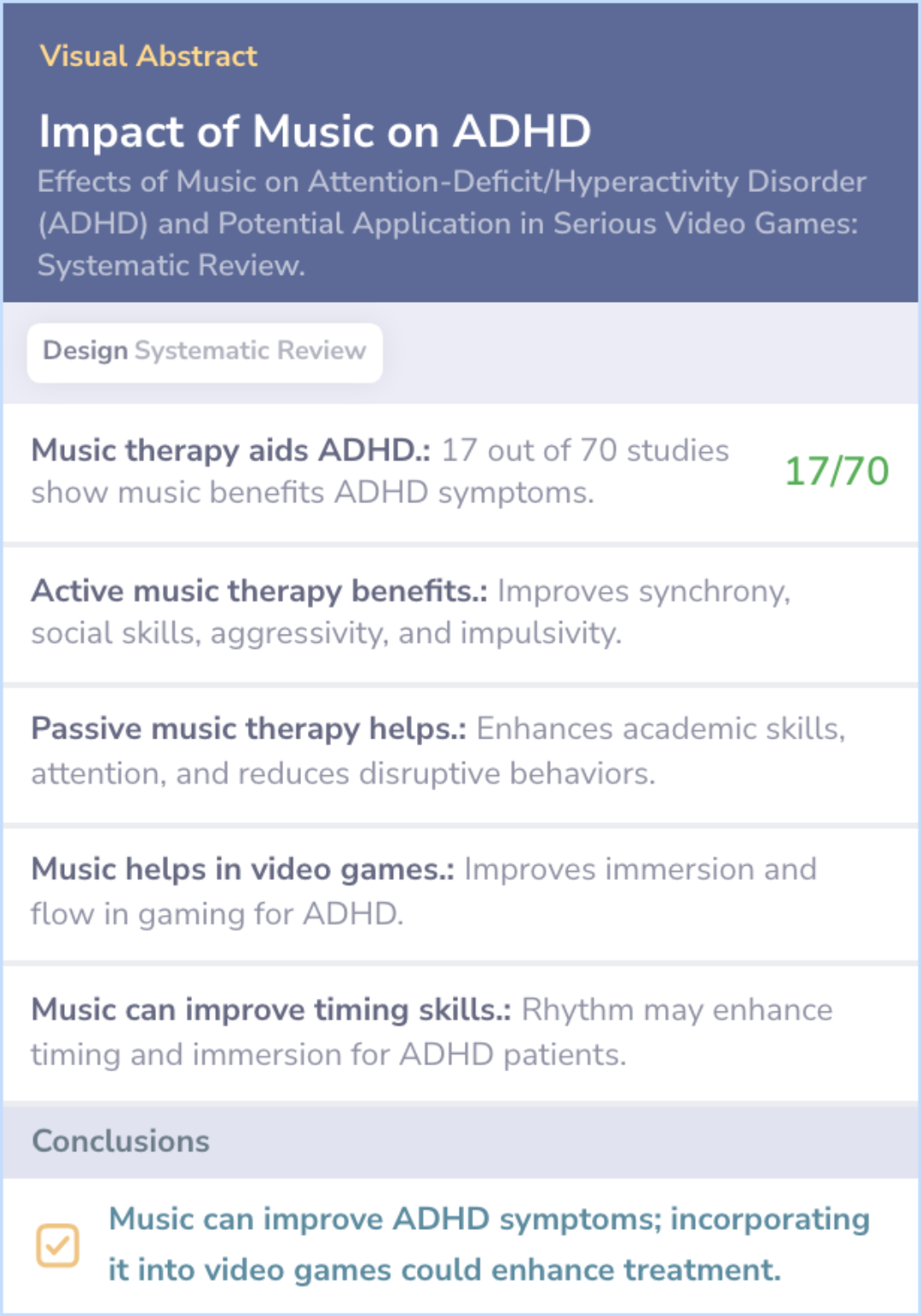
Literature Review
Madjar et al, 2020
Core Insight:Both papers investigate music's impact on ADHD, finding it beneficial, but differ in context and metrics.
What It Adds:
Different Contexts Studied: Main paper explores music in therapy and games; this paper studies background music in learning.
Measured Outcomes: Comparison paper assesses reading skills and heart rate; main paper examines overall ADHD symptoms.
Key Differences:Comparison paper finds music helps ADHD in specific tasks, not typically developed peers.
